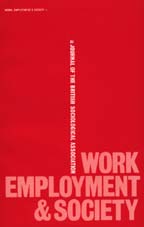Article contents
Post-Communist Workplace Relations in Hungary: Case Studies from the Clothing Industry
Published online by Cambridge University Press: 09 January 2001
Abstract
A decade after the fall of communism scholars widely agree that the transformation process of democratisation and marketisation in central eastern Europe (CEE) has left unions (new and independent and successors to the official communist unions alike) with little power to influence political and economic decision-making (Ost 1997; Thirkell et al. 1998). Typical explanations invoke economic factors such as privatisation, the restructuring of the economy and of firms, and the depressed labour market. They also highlight an increasingly hostile environment for unions created by a majority of the new private owners, which is supplemented by ‘distancing’ governments following neo-liberal policies (Pollert 1998). However, I argue that these factors as explanations for union weakness are not entirely convincing. For example, management behaviour and the political context clearly influences the power resources of unions but cannot entirely determine the position and policies of individual unions.
- Type
- NOTES AND ISSUES
- Information
- Copyright
- © 2000 BSA Publications Ltd
- 3
- Cited by




